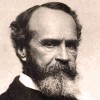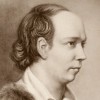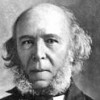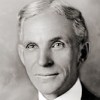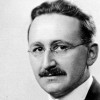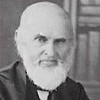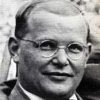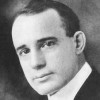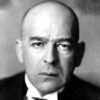I sing of warfare and a man at war.
From the sea-coast of Troy in early days
He came to Italy by destiny,
To our Lavinian western shore,
A fugitive, this captain, buffeted
Cruelly on land as on the sea
By blows from powers of the air — behind them
Baleful Juno in her sleepless rage.
And cruel losses were his lot in war,
Till he could found a city and bring home
His gods to Latium, land of the Latin race,
The Alban lords, and the high walls of Rome.[Arma virumque canō, Trōiae quī prīmus ab ōrīs
Ītaliam, fātō profugus, Lāvīniaque vēnit
lītora, multum ille et terrīs iactātus et altō
vī superum saevae memorem Iūnōnis ob īram;
multa quoque et bellō passus, dum conderet urbem,
inferretque deōs Latiō, genus unde Latīnum,
Albānīque patrēs, atque altae moenia Rōmae.]Virgil (70-19 BC) Roman poet [b. Publius Vergilius Maro; also Vergil]
The Aeneid [Ænē̆is], Book 1, l. 1ff (1.1-7) (29-19 BC) [tr. Fitzgerald (1981)]
(Source)
(Source (Latin)). Alternate translations:Arms and the man I sing who first did come,
Driven by fate, from Troy to Latium.
And Tyrrhen shores; Much toff'd by Land and Sea
By wrath of Gods, and lasting enmity
Of cruell Juno, suffering much by Wars
Whiles he a Citie builds, and Gods transfers
To Latium whence, Latine Originalls
The Alban fathers, and Romes lofty walls.
[tr. Ogilby (1649)]Arms, and the man I sing, who, forc'd by fate,
And haughty Juno's unrelenting hate,
Expell'd and exil'd, left the Trojan shore.
Long labours, both by sea and land, he bore,
And in the doubtful war, before he won
The Latian realm, and built the destin'd town;
His banish'd gods restor'd to rites divine,
And settled sure succession in his line,
From whence the race of Alban fathers come,
And the long glories of majestic Rome.
[tr. Dryden (1697)]Arms I sing, and the hero, who first, exiled by fate, came from the coast of Troy to Italy, and by the Lavinian shore: much was he tossed both on sea and land, by the power of those above, on account of the unrelenting rage of cruel Juno: much too he suffered in war till he founded a city, and brought his gods into LatiumL from whence the Latin progeny, the Alban fathers, and the walls of lofty Rome.
[tr. Davidson/Buckley (1854)]Arms and the man I sing, who first,
By Fate of Ilian realm amerced,
To fair Italia onward bore,
And landed on Lavinium’s shore: --
Long tossing earth and ocean o’er,
By violence of heaven, to sate
Fell Juno’s unforgetting hate:
Much laboured too in battle-field,
Striving his city’s walls to build,
And give his Gods a home:
Thence come the hardy Latin brood,
The ancient sires of Alba’s blood,
And lofty-rampired Rome.
[tr. Conington (1866)]I sing of arms, and of the man who first
Came from the coasts of Troy to Italy
And the Lavinian shores, exiled by fate.
Much was he tossed about upon the lands
And on the ocean by supernal powers,
Because of cruel Juno's sleepless wrath.
Many things also suffered he in war,
Until he built a city, and his gods
Brought into Latium, whence the Latin race,
The Alban sires, and walls of lofty Rome.
[tr. Cranch (1872)]I sing of arms and the man who of old from the coasts of Troy came, an exile of fate, to Italy and the shore of Lavinium; hard driven on land and on the deep by the violence of heaven, for cruel Juno's unforgetful anger, and hard bestead in war also, ere he might found a city and carry his gods into Latium; from whom is the Latin race, the lords of Alba, and the stately city Rome.
[tr. Mackail (1885)]I sing of arms, I sing of him, who from the Trojan land
Thrust forth by Fate, to Italy and that Lavinian strand
First came: all tost about was he on earth and on the deep
By heavenly might for Juno's wrath, that had no mind to sleep:
And plenteous war he underwent ere he his town might frame
And set his Gods in Latian earth, whence is the Latin name,
And father-folk of Alba-town, and walls of mighty Rome.
[tr. Morris (1900)]Of arms I sing, and of the man, whom Fate
First drove from Troy to the Lavinian shore.
Full many an evil, through the mindful hate
Of cruel Juno, from the gods he bore,
Much tost on earth and ocean, yea, and more
In war enduring, ere he built a home,
And his loved household-deities brought o'er
To Latium, whence the Latin people come,
Whence rose the Alban sires, and walls of lofty Rome.
[tr. Taylor (1907), st. 1]Arms and the man I sing, who first made way,
predestined exile, from the Trojan shore
to Italy, the blest Lavinian strand.
Smitten of storms he was on land and sea
by violence of Heaven, to satisfy
stern Juno's sleepless wrath; and much in war
he suffered, seeking at the last to found
the city, and bring o'er his fathers' gods
to safe abode in Latium; whence arose
the Latin race, old Alba's reverend lords,
and from her hills wide-walled, imperial Rome.
[tr. Williams (1910)]Arms I sing and the man who first from the coasts of Troy, exiled by fate, came to Italy and Lavinian shores; much buffeted on sea and land by violence from above, through cruel Juno's unforgiving wrath, and much enduring in war also, till he should build a city and bring his gods ot Latium; whence came the Latin race, the lords of Alba, and the walls of lofty Rome.
[tr. Fairclough (1916)]Arms and the man I sing, the first who came,
Compelled by fate, an exile out of Troy,
To Italy and the Lavinian coast,
Much buffeted on land and on the deep
By violence of the gods, through that long rage,
That lasting hate, of Juno’s. And he suffered
Much, also, in war, till he should build his town
And bring his gods to Latium, whence, in time,
The Latin race, the Alban fathers, rose
And the great walls of everlasting Rome.
[tr. Humphries (1951)]I tell about war and the hero who first from Troy's frontier,
Displaced by destiny, came to the Lavinian shores,
To Italy -- a man much travailed on sea and land
By the powers above, because of the brooding anger of Juno,
Suffering much in war until he could found a city
And march his gods into Latium, whence rose the Latin race,
The royal line of Alba and the high walls of Rome.
[tr. Day Lewis (1952)]I sing of arms and of a man: his fate
had made him fugitive; he was the first
to journey from the coasts of Troy as far
as Italy and the Lavinian shores.
Across the lands and waters he was battered
beneath the violence of High Ones, for
the savage Juno's unforgetting anger;
and many sufferings were his in war
until he brought a city into being
and carried in his gods to Latium;
from this have come the Latin race, the lords
of Alba, and the ramparts of high Rome.
[tr. Mandelbaum (1971)]I sing of arms and of the man, fated to be an exile, who long since left the land of Troy and came to Italy to the shores of Lavinium; and a great pounding he took by land and sea at the hands of the heavenly gods because of the fierce and unforgetting anger of Juno. Great too were his suffering in war before he could found his city and carry his gods into Latium. this was the beginning of the Latin race, the Alban fathers and the high walls of Rome.
[tr. West (1990)]I sing of arms and the man, he who, exiled by fate,
first came from the coast of Troy to Italy, and to
Lavinian shores – hurled about endlessly by land and sea,
by the will of the gods, by cruel Juno’s remorseless anger,
long suffering also in war, until he founded a city
and brought his gods to Latium: from that the Latin people
came, the lords of Alba Longa, the walls of noble Rome.
[tr. Kline (2002)]Arms I sing -- and a man,
The first to come from the shores
Of Troy, exiled by Fate, to Italy
And the Lavinian coast; a man battered
On land and sea by the powers above
In the face of Juno's relentless wrath;
A man who also suffered greatly in war
Until he could found his city and bring his gods
Into Latium, from which arose
The Latin people, our Alban forefathers,
And the high walls of everlasting Rome.
[tr. Lombardo (2005)]Wars and a man I sing -- an exile driven on by Fate,
he was the first to flee the coast of Troy,
destined to reach Lavinian shores and Italian soil,
yet many blows he took on land and sea from the gods above --
thanks to cruel Juno’s relentless rage -- and many losses
he bore in battle too, before he could found a city,
bring his gods to Latium, source of the Latin race,
the Alban lords and the high walls of Rome.
[tr. Fagles (2006)]My song is of war and a man: a refugee by fate,
the first from Troy to Italy's Lavinian shores,
battered much on land and sea by blows from gods
obliging brutal Juno's unforgetting rage;
he suffered much in war as well, all to plant
his town and gods in Latium. From here would rise
the Latin race, the Alban lords, and Rome's high walls.
[tr. Bartsch (2021)]
To learn who rules over you, simply find out who you are not allowed to criticize.
Voltaire (1694-1778) French writer [pseud. of Francois-Marie Arouet]
(Spurious)
Frequently attributed in memes, but unsourced in any of his writings. More accurately attributed to Kevin Alfred Strom during a 1993 anti-semitic screed on a radio broadcast: "To determine the true rulers of any society, all you must do is ask yourself this question: Who is it that I am not permitted to criticize?" More discussion here.
A politician’s words reveal less about what he thinks about his subject than what he thinks about his audience.
George Will (b. 1941) American political commentator
(Attributed)
(Source)
Quoted in Richard Reeves, A Ford, Not a Lincoln, ch. 1 (1975). Will is commenting about a statement made by Ronald Reagan in Harper's Magazine (Mar 1975)
Certain educators […] disapproved of the teaching of propaganda analysis on the grounds that it would make adolescents unduly cynical. Nor was it welcomed by the military authorities, who were afraid that recruits might start to analyze the utterances of drill sergeants. And then there were the clergymen and the advertisers. The clergymen were against propaganda analysis as tending to undermine belief and diminish churchgoing; the advertisers objected on the grounds that it might undermine brand loyalty and reduce sales.
Considering history as a moral exercise, her lessons would be too unfrequent if confined to real life. Of those recorded by historians few incidents have been attended with such circumstances as to excite in any high degree this sympathetic emotion of virtue. We are therefore wisely framed to be as warmly interested for a fictitious as for a real personage. The spacious field of imagination is thus laid open to our use, and lessons may be formed to illustrate and carry home to the mind every moral rule of life. Thus a lively and lasting sense of filial duty is more effectually impressed on the mind of a son or daughter by reading King Lear, than by all the dry volumes of ethics and divinity that ever were written.
Thomas Jefferson (1743-1826) American political philosopher, polymath, statesman, US President (1801-09)
Letter to Robert Skipwith (3 Aug 1771)
(Source)
Caesar, when embarking in a storm, said that it was not necessary he should live, but that it was absolutely necessary he should get to the place to which he was going.
Lord Chesterfield (1694-1773) English statesman, wit [Philip Dormer Stanhope]
Letter to his son, #203 (24 Nov 1749)
(Source)
Whatever the laws may provide, however lofty may be their sentiments, a man without a vote is a man without protection; he is virtually helpless.
Lyndon B. Johnson (1908-1973) American politician, educator, US President (1963-69)
Speech (1960-03-10), U.S. Senate
(Source)
As Senate Majority Leader.
First, you know, a new theory is attacked as absurd; then it is admitted to be true, but obvious and insignificant; finally it is seen to be so important that its adversaries claim that they themselves discovered it.
William James (1842-1910) American psychologist and philosopher
Pragmatism: A New Name for Some Old Ways of Thinking (1907)
(Source)
I believe that the officers, and, especially, the directors, of corporations should be held personally responsible when any corporation breaks the law.
Theodore Roosevelt (1858-1919) American politician, statesman, conservationist, writer, US President (1901-1909)
“The New Nationalism,” speech, Osawatomie, Kansas (31 Aug 1910)
(Source)
To love what you do and feel that it matters — how could anything be more fun?
Katharine Graham (1917-2001) American newspaper publisher
In “The Power That Didn’t Corrupt,” Ms. Magazine (Oct 1974)
More discussion of this quotation's origins here: To Love What You Do and Feel That It Matters—How Could Anything Be More Fun? – Quote Investigator.
Sometimes misquoted as "how could anything else be more fun".
Love conquers all; let us, too, yield to Love!
[Omnia vincit amor; et nos cedamus amori.]
Virgil (70-19 BC) Roman poet [b. Publius Vergilius Maro; also Vergil]
Eclogues [Eclogae, Bucolics, Pastorals], No. 10 “Gallus,” l. 69 (10.69) (42-38 BC) [tr. Fairclough (Loeb) (1916)]
(Source)
(Source (Latin)). Alternate translations:Love conquers all, let us give place to love.
[tr. Ogilby (1649)]In Hell, and Earth, and Seas, and Heav'n above,
Love conquers all; and we must yield to Love.
[tr. Dryden (1709), ll. 98-99]Love conquers all; and we must yield to love.
[tr. Wrangham (1830), l. 81]Love conquers all; and let us yield to love.
[tr. Davidson (1854)]Love's lord of all. Let me too yield to Love.
[tr. Calverley (c. 1871)]Love conquers all nature; we too must yield to love.
[tr. Wilkins (1873)]Love reigns with undisputed sway,
And we the mighty god obey.
[tr. King (1882), ll. 1009-10]Love will but tamper with the shaft he drove.
And we must yield to all-subduing Love.
[tr. Palmer (1883)]Love conquers all things; yield we too to love!
[tr. Greenough (1895)]Love conquers everything; let us also yield to love.
[tr. Bryce (1897)]Love conquers all: let us too yield to Love.
[tr. Mackail (1899)]Love conquers all things -- let us yield to love.
[tr. Mackail/Cardew (1908)]Love masters all. We, too, submit to love.
[tr. Williams (1915)]Love carries all before him: I too must yield to Love.
[tr. Rieu (1949)]Love is the tyrant
Of all, so let me bow to his domination.
[tr. Johnson (1960)]All-conquering is Love -- no use to fight against him.
[tr. Day Lewis (1963)]Love conquers all, and all must yield to love.
[tr. Ferry (1999)]Love conquers all: and let us give way to Love.
[tr. Kline (2001)]
In the way that scepticism is sometimes applied to issues of public concern, there is a tendency to belittle, to condescend, to ignore the fact that, deluded or not, supporters of superstition and pseudoscience are human beings with real feelings, who, like the sceptics, are trying to figure out how the world works and what our role in it might be. Their motives are in many cases consonant with science. If their culture has not given them all the tools they need to pursue this great quest, let us temper our criticism with kindness. None of us comes fully equipped.
Money is the mother’s milk of politics.
Jesse Unruh (1922-1987) American politican
(Attributed)
(Source)
His "signature" saying on campaign contributions. Though often cited to 1966, it is attributed to him (first?) in Time, "Politics: Hale Fellow at Yale" (14 Dec 1962), and shows up in numerous locations the following year.
All you learn and all you can read will be of little use to you if you do not think and reason upon it yourself. One reads to know other people’s thoughts, but if we take them upon trust, without examining and comparing them with our own, it is really living upon other people’s scraps or retailing other people’s goods. To know the thoughts of others, is of use, because it suggests thoughts to one’s self, and helps one to form a judgment; but to repeat other people’s thoughts, without considering whether they are right or wrong, is the talent only of a parrot, or at most a player.
Lord Chesterfield (1694-1773) English statesman, wit [Philip Dormer Stanhope]
Letter to his son, #67, “Thursday” (1740-41)
(Source)
Reality cannot be ignored, except at a price; and the longer the ignorance is persisted in, the higher and more terrible becomes the price that must be paid.
The real persuaders are our appetites, our fears, and above all our vanity. The skillful propagandist stirs and coaches these internal persuaders.
Eric Hoffer (1902-1983) American writer, philosopher, longshoreman
The Passionate State of Mind, Aphorism 218 (1955)
(Source)
I am for freedom of religion, & against all maneuvres to bring about a legal ascendancy of one sect over another.
Thomas Jefferson (1743-1826) American political philosopher, polymath, statesman, US President (1801-09)
Letter (1799-01-26) to Elbridge Gerry
(Source)
Did you ever think that making a speech on economics is a lot like pissin’ down your leg? It seems hot to you, but it never does to anyone else.
Lyndon B. Johnson (1908-1973) American politician, educator, US President (1963-69)
Comment (1965 c.) to John Kenneth Galbraith
(Source)
Quoted in Galbraith, Name-Dropping, ch. 11 (1999).
History is a bath of blood.
William James (1842-1910) American psychologist and philosopher
“The Moral Equivalent of War” (1906)
(Source)
The teachers of the law and the Pharisees sit in Moses’ seat. So you must be careful to do everything they tell you. But do not do what they do, for they do not practice what they preach. They tie up heavy, cumbersome loads and put them on other people’s shoulders, but they themselves are not willing to lift a finger to move them. Everything they do is done for people to see: They make their phylacteries wide and the tassels on their garments long; they love the place of honor at banquets and the most important seats in the synagogues; they love to be greeted with respect in the marketplaces and to be called ‘Rabbi’ by others.
The Bible (The New Testament) (AD 1st - 2nd C) Christian sacred scripture
Matthew 23:2-7 (NIV)
(Source)
Alt trans:
- "The scribes and the Pharisees sit on Moses' seat; so practice and observe whatever they tell you, but not what they do; for they preach, but do not practice. They bind heavy burdens, hard to bear, and lay them on men's shoulders; but they themselves will not move them with their finger. They do all their deeds to be seen by men; for they make their phylacteries broad and their fringes long, and they love the place of honor at feasts and the best seats in the synagogues, and salutations in the market places, and being called rabbi by men." [NRSV]
- "The scribes and the Pharisees sit in Moses' seat: All therefore whatsoever they bid you observe, that observe and do; but do not ye after their works: for they say, and do not. For they bind heavy burdens and grievous to be borne, and lay them on men's shoulders; but they themselves will not move them with one of their fingers. But all their works they do for to be seen of men: they make broad their phylacteries, and enlarge the borders of their garments, and love the uppermost rooms at feasts, and the chief seats in the synagogues, and greetings in the markets, and to be called of men, Rabbi, Rabbi." [KJV]
It ain’t bekauze lovers are so sensitiff that they quarrel so often, it iz bekauze there iz so much phun in making up.
[It ain’t because lovers are so sensitive that they quarrel so often, it is because there is so much fun in making up.]
On the one hand, security and justice require centralized governmental control, which must extend to the creation of a world government if it is to be effective. Progress, on the contrary, requires the utmost scope for personal initiative that is compatible with social order.
Bertrand Russell (1872-1970) English mathematician and philosopher
Authority and the Individual, Lecture 6 (1949)
(Source)
Collection, with some edits, of the inaugural Reith Lectures, BBC, "Authority and the Individual," No. 6 "Individual and Social Ethics" (1949-01-30).
[O]ur government, national and State, must be freed from the sinister influence or control of special interests. Exactly as the special interests of cotton and slavery threatened our political integrity before the Civil War, so now the great special business interests too often control and corrupt the men and methods of government for their own profit. We must drive the special interests out of politics.
Theodore Roosevelt (1858-1919) American politician, statesman, conservationist, writer, US President (1901-1909)
“The New Nationalism,” speech, Osawatomie, Kansas (31 Aug 1910)
(Source)
The ancient poets animated all objects with Gods or Geniuses, calling them by the names and adorning them with the properties of woods, rivers, mountains, lakes, cities, nations, and whatever their enlarged & numerous senses could perceive. And particularly they studied the genius of each city & country, placing it under its mental deity; Till a system was formed, which some took advantage of, & enslav’d the vulgar by attempting to realize or abstract the mental deities from their objects: thus began priesthood; Choosing forms of worship from poetic tales. And at length they pronounc’d that the Gods had order’d such things. Thus men forgot that all deities reside in the human breast.
William Blake (1757-1827) English poet, mystic, artist
The Marriage of Heaven and Hell, “Proverbs of Hell”, l. 71 (1790–93)
(Source)
Let us go singing as far as we go: the road will be less tedious.
[Cantantes licet usque (minus via laedit) eamus.]
Virgil (70-19 BC) Roman poet [b. Publius Vergilius Maro; also Vergil]
Eclogues [Eclogae, Bucolics, Pastorals], No. 9 “Lycidas and Moeris,” l. 64ff (9.64) [Lycidas] (42-38 BC)
(Source)
(Source (Latin)). Alternate translations:Singing lets goe, the way shall better please.
[tr. Ogilby (1649)]A Song will help the beating Storm to bear.
[tr. Dryden (1709), l. 89]Light song will ease the road of half its care.
[tr. Wrangham (1830), l. 76]Yet we may still go on singing; the way will be less tedious.
[tr. Davidson (1854)]Singing let us journey on --
(The way will seem less tedious).
[tr. Calverley (c. 1871)]We may as well sing -- it makes the journey less irksome.
[tr. Wilkins (1873)]Move on, and should the way seem long,
Shorten the distance with a song.
[tr. King (1882), ll. 915-916]Walk on, and make
The road less tedious with our verse.
[tr. Palmer (1883)]Then singing let us go,
our way to lighten.
[tr. Greenough (1895)]Let us go on still singing; the way is less tedious.
[tr. Bryce (1897)]We may go singing all the way, and the road weary us the less.
[tr. Mackail (1899)]Let us go singing to beguile our way.
[tr. Mackail/Cardew (1908)]Let us go forward singing, for the path
Tires us less so.
[tr. Williams (1915)]We may yet go singing on our way -- it makes the road less irksome.
[tr. Fairclough (Loeb) (1916)]Let us sing carols all the way: 'twill be
Less tedious.
[tr. Royds (1922)]Why not go forward singing all the way? It makes the going easier.
[tr. Rieu (1949)]We still may sing as we go and lighten the journey.
[tr. Johnson (1960)]We can press on,
Singing as we go: a song lightens a long road.
[tr. Day Lewis (1963), ll. 63-64]Let's keep on going, but singing as we go.
Sing makes the journey easier.
[tr. Ferry (1999)]We might go along singing (the road will be less tedious).
[tr. Kline (2001)]
Most people today don’t want honest answers insofar as honest means unpleasant or disturbing. They want a soft answer that turneth away anxiety. They want answers that are, in effect, escapes.
I often observed to my brother, You see now how little nature requires to be satisfied. Felicity, the companion of content, is rather found in our own breasts than in the enjoyment of external things; And I firmly believe it requires but a little philosophy to make a man happy in whatsoever state he is. This consists in a full resignation to the will of Providence; and a resigned soul finds pleasure in a path strewed with briars and thorns.
Make it thy chief Design and thy great Business, not to be Rich and Great: but so to live in this World that thou mayest reasonably believe thou has God for thy Friend.
Thomas Fuller (1654-1734) English physician, preacher, aphorist, writer
Introductio ad Prudentiam, Vol. 1, # 939 (1725)
(Source)
You do not wipe away the scars of centuries by saying: “Now, you are free to go where you want, do as you desire, and choose the leaders you please.” You do not take a man who for years has been hobbled by chains, liberate him, bring him to the starting line of a race, saying, “You are free to compete with all the others,” and still justly believe you have been completely fair. Thus it is not enough just to open the gates of opportunity. All our citizens must have the ability to walk through those gates.
This is the next and the more profound stage of the battle for civil rights. We seek not just freedom but opportunity. We seek not just legal equity but human ability, not just equality as a right and a theory but equality as a fact and equality as a result.
Lyndon B. Johnson (1908-1973) American politician, educator, US President (1963-69)
Speech (1965-06-04), Commencement, Howard University
(Source)
On Affirmative Action.
Modern war is so expensive that we feel trade to be a better avenue to plunder; but modern man inherits all the innate pugnacity and all the love of glory of his ancestors. Showing war’s irrationality and horror is of no effect on him. The horrors make the fascination. War is the strong life; it is life in extremis; war taxes are the only ones men never hesitate to pay, as the budgets of all nations show us.
William James (1842-1910) American psychologist and philosopher
“The Moral Equivalent of War” (1906)
(Source)
We need examples of people who, leaving Heaven to decide whether they are to rise in the world, decide for themselves that they will be happy in it, and have resolved to seek — not greater wealth, but simpler pleasure; not higher fortune, but deeper felicity; making the first of possessions, self-possession; and honouring themselves in the harmless pride and calm pursuits of peace.
John Ruskin (1819-1900) English art critic, painter, writer, social thinker
Unto This Last, Essay 4 “Ad Valorem” (1860)
(Source)
The true technical genius has triumphed when he has made himself unnecessary. It is only the quack who makes himself indispensable.
Gilbert Keith Chesterton (1874-1936) English journalist and writer
Illustrated London News, “Civilization and Progress” (30 Nov 1912)
(Source)
Responsibility, not to a superior, but to one’s conscience, the awareness of a duty not exacted by compulsion, the necessity to decide which of the things one values are to be sacrificed to others, and to bear the consequences of one’s own decision, are the very essence of any morals which deserve the name.
Without contraries is no progression. Attraction and repulsion, reason and energy, love and hate, are necessary to human existence.
William Blake (1757-1827) English poet, mystic, artist
The Marriage of Heaven and Hell, “The Argument” (1790–93)
(Source)
Time robs us of all, even of memory.
[Omnia fert aetas, animum quoque.]Virgil (70-19 BC) Roman poet [b. Publius Vergilius Maro; also Vergil]
Eclogues [Eclogae, Bucolics, Pastorals], No. 9 “Lycidas and Moeris,” l. 51 (9.51) [Moeris] (42-38 BC) [tr. Fairclough (Loeb) (1916)]
(Source)
(Source (Latin)). Alternate translations:Age all things wasts: the minde too.
[tr. Ogilby (1649)]The rest I have forgot, for Cares and Time
Change all things, and untune my Soul to Rhyme.
[tr. Dryden (1709), ll. 70-71]Ah! age, which pilfers all, not e'en the memory spares!
[tr. Wrangham (1830), l. 60]Age bears away all things, even the mind itself.
[tr. Davidson (1854)]Time carries all -- our memories e'en -- away.
[tr. Calverley (c. 1871)]Time steals everything, memory among the rest.
[tr. Wilkins (1873)]Now memory scarce can aught recall;
The note is lost, the voice, the all.
[tr. King (1882), ll. 901-902]Alas! Old age bears hard on everything;
On memory most.
[tr. Palmer (1883)]Time carries all things, even our wits, away.
[tr. Greenough (1895)]Age bears away all things, even the memory itself.
[tr. Bryce (1897)]Time runs away with all things, the mind too.
[tr. Mackail (1899)]How time wears all things out!
Even the memory.
[tr. Mackail/Cardew (1908)]Ah, time takes all we have, the memory too.
[tr. Williams (1915)]Time bears away
All things, even the mind.
[tr. Royds (1922)]Time carries everything away, even our memory.
[tr. Rieu (1949)]Age robs us of all things,
Even the mind.
[tr. Johnson (1960)]Time bears all away, even memory.
[tr. Day Lewis (1963)]Time takes all we have away from us.
[tr. Ferry (1999)]Time takes away all things, memory too.
[tr. Kline (2001)]
If you can impress on any man with an absorbing conviction of the supreme importance of some moral or religious doctrine; if you can make him believe that those who reject that doctrine are doomed to eternal perdition; if you then give that man power, and by means of his ignorance blind him to the ulterior consequences of his own act — he will infallibly persecute those who deny his doctrine; and the extent of his persecution will be regulated by the extent of his sincerity.
Henry Thomas Buckle (1821-1862) English historian
History of Civilization in England, 1.4 (1858)
The reciprocal civility of authors is one of the most risible scenes in the farce of life.
Samuel Johnson (1709-1784) English writer, lexicographer, critic
The Life of Sir Thomas Browne (1756)
(Source)
CROMWELL: You don’t seem to appreciate the seriousness of your position.
MORE: I defy anyone to live in that cell for a year and not appreciate the seriousness of his position.
CROMWELL: Yet the State has harsher punishments.
MORE: You threaten like a dockside bully.
CROMWELL: How should I threaten?
MORE: Like a Minister of State, with justice!
CROMWELL: Oh, justice is what you’re threatened with.
MORE: Then I’m not threatened.
Labor and abstinence are two of the best physicians in the world.
Thomas Tryon (1634-1703) English merchant, author, vegetarian
The Country-Man’s Companion (1684)
The lack of objectivity, as far as foreign nations are concerned, is notorious. From one day to another, another nation is made out to be utterly depraved and fiendish, while one’s own nation stands for everything that is good and noble. Every action of the enemy is judged by one standard — every action of oneself by another. Even good deeds by the enemy are considered a sign of particular devilishness, meant to deceive us and the world, while our bad deeds are necessary and justified by our noble goals, which they serve.
Erich Fromm (1900-1980) American psychoanalyst and social philosopher
The Art of Loving, ch. 5 (1956)
(Source)
But a short time elapsed after the death of the great reformer of the Jewish religion before his principles were departed from by those who professed to be his special servants, & perverted into an engine for enslaving mankind, and aggrandizing their oppressors in church & state: that the purest system of morals ever before preached to man has been adulterated & sophisticated, by artificial constructions, into a mere contrivance to filch wealth & power to themselves, that rational men not being able to swallow their impious heresies, in order to force them down their throats, they raise the hue & cry of infidelity, while themselves are the greatest obstacles to the advancement of the real doctrines of Jesus, and do in fact constitute the real Anti-Christ.
Thomas Jefferson (1743-1826) American political philosopher, polymath, statesman, US President (1801-09)
Letter to William Baldwin (unsent) (19 Jan 1810)
(Source)
You can’t just ask customers what they want and then try to give that to them. By the time you get it built, they’ll want something new.
Steve Jobs (1955-2011) American computer inventor, entrepreneur
“The Entrepreneur of the Decade Award,” Interview, Inc. Magazine (1 Apr 1989)
(Source)
Promise little, and do much; so shalt thou have Thanks.
Thomas Fuller (1654-1734) English physician, preacher, aphorist, writer
Introductio ad Prudentiam, Vol. 1, # 111 (1725)
(Source)
It’s probably better to have him inside the tent pissing out, than outside the tent pissing in.
Lyndon B. Johnson (1908-1973) American politician, educator, US President (1963-69)
Quoted in David Halberstam, book review, New York Times (1971-10-31)
(Source)
Review of the just-published Lyndon Johnson, Vantage Point: Perspectives of the Presidency 1963-1969, regarding the difficulty for him to fire FBI Director, J. Edgar Hoover. Halberstam notes this as a Johnson quotation not found in the book, complaining that it's far too sanitized a retelling of Johnson's presidency. This is generally accepted as the earliest printed mention of the quotation.
We must frankly confess, then, using our empirical common sense and ordinary practical prejudices, that in the world that actually is, the virtues of sympathy, charity, and non-resistance may be, and often have been, manifested in excess. … You will agree to this in general, for in spite of the Gospel, in spite of Quakerism, in spite of Tolstoi, you believe in fighting fire with fire, in shooting down usurpers, locking up thieves, and freezing out vagabonds and swindlers.
William James (1842-1910) American psychologist and philosopher
The Varieties of Religious Experience, Lectures 14 & 15 “The Value of Saintliness” (1902)
(Source)
Besides being complicated, reality, in my experience, is usually odd.
C. S. Lewis (1898-1963) English writer, literary scholar, lay theologian [Clive Staples Lewis]
Mere Christianity, Book 2 “What Christians Believe,” ch. 1 “The Rival Conceptions of God” (1943)
(Source)
Don’t ever promise more than you can deliver, but always deliver more than you promise.
Louis "Lou" Holtz (b. 1937) American football coach, sportscaster, author, motivational speaker.
Larry King television interview, CNN (20 Aug 1993)
At least when the Emperor Justinian, a sky-god man, decided to outlaw sodomy, he had to come up with a good practical reason, which he did. It is well known, Justinian declared, that buggery is a principal cause of earthquakes, and so must be prohibited. But our sky-godders, always eager to hate, still quote Leviticus, as if that looney text had anything useful to say about anything except, perhaps, the inadvisability of eating shellfish in the Jerusalem area.
Gore Vidal (1925-2012) American novelist, dramatist, critic
“America First? America Last? America at Last?” Lowell Lecture, Harvard University (20 Apr 1992)
(Source)
In every wise struggle for human betterment one of the main objects, and often the only object, has been to achieve in large measure equality of opportunity. In the struggle for this great end, nations rise from barbarism to civilization, and through it people press forward from one stage of enlightenment to the next. One of the chief factors in progress is the destruction of special privilege. The essence of any struggle for healthy liberty has always been, and must always be, to take from some one man or class of men the right to enjoy power, or wealth, or position, or immunity, which has not been earned by service to his or their fellows. That is what you fought for in the Civil War, and that is what we strive for now.
Theodore Roosevelt (1858-1919) American politician, statesman, conservationist, writer, US President (1901-1909)
“The New Nationalism,” speech, Osawatomie, Kansas (31 Aug 1910)
(Source)
I know only that what is moral is what you feel good after, and what is immoral is what you feel bad after.
Prisons are built with stones of law, brothels with bricks of religion.
William Blake (1757-1827) English poet, mystic, artist
The Marriage of Heaven and Hell, “Proverbs of Hell”, l. 21 (1790–93)
(Source)
For the Father of agriculture
Gave us a hard calling: he first decreed it an art
To work the fields, sent worries to sharpen our mortal wits
And would not allow his realm to grow listless from lethargy […]
So thought and experiment might forge man’s various crafts
Little by little, asking the furrow to yield the corn-blade,
Striking the hidden fire that lies in the veins of flint.[Pater ipse colendi
haud facilem esse viam voluit, primusque per artem
movit agros curis acuens mortalia corda
nec torpere gravi passus sua regna veterno […]
ut varias usus meditando extunderet artis
paulatim et sulcis frumenti quaereret herbam.
Ut silicis venis abstrusum excuderet ignem.]Virgil (70-19 BC) Roman poet [b. Publius Vergilius Maro; also Vergil]
Georgics [Georgica], Book 1, l. 121ff (1.121-124, 133-135) (29 BC) [tr. Day-Lewis (1940)]
(Source)
Telling how Jupiter made life on earth miserable for farmers so as to encourage the development of useful arts and crafts.
(Source (Latin)). Alternate translations:Nor was Jove pleas'd tillage should easie be:
And first commands with art to plough the soyle,
On mortall hearts imposing care, and toyle;
Nor lets dull sloth benumb men where he reigns [...]
That severall arts by labour might be found,
And men in furrows seek the grain that fell,
And hidden fire from veins of flint compell.
[tr. Ogilby (1649)]The Sire of Gods and Men, with hard Decrees,
Forbids our Plenty to be bought with Ease:
And wills that Mortal Men, inur'd to toil,
Shou'd exercise, with pains, the grudging Soil.
Himself invented first the shining Share,
And whetted Humane Industry by Care:
Himself did Handy-Crafts and Arts ordain;
Nor suffer'd Sloath to rust his active Reign[...]
That studious Need might useful Arts explore;
From furrow'd Fields to reap the foodful Store:
And force the Veins of clashing Flints t' expire
The lurking Seeds of their Cœlestial Fire.
[tr. Dryden (1709), l. 183-190, 203-206]Nor thou repine: great Jove, with tasks untry'd
To rouse man's pow'rs, an easier way deny'd;
And first bade mortals stir with art the plain,
Lest sloth should dim the splendors of his reign [...]
That gradual use might hew out arts from man,
That corn's green blade in furrows might be fought,
And from struck flints the fiery sparkle caught.
[tr. Nevile (1767), l. 147-150, 160-162]Not to dull Indolence and transient Toil
Great Jove resign'd the conquest of the soil:
He sent forth Care to rouse the human heart,
And sharpen genius by inventive art:
Nor tamely suffer'd earth beneath his sway
In unproductive sloth to waste away. [...]
Jove will'd that use, by long experience taught,
Should force out various arts by gradual thought,
Strike from the flint's cold womb the latent flame,
And from the answering furrow nurture claim.
[tr. Sotheby (1800)]The Sire himself willed the ways of tillage not to be easy, and first aroused the fields by art, whetting the skill of mortals with care; nor suffered he his reign to lie inactive in heavy sloth [...] that experience, by dint of thought, might gradually hammer out the various arts, in furrows seek the blade of corn, and form the veins of flint strike out the hidden fire.
[tr. Davidson (1854)]Our heavenly Father hath not judged it right
To leave the road of agriculture light:
'Twas he who first made husbandry a plan.
And care a whetstone for the wit of man;
Nor suffer'd he his own domains to lie
Asleep in cumbrous old-world lethargy [...]
That practice might the various arts create,
On study's anvil, by laborious dint,
The plant of corn by furrows propagate,
And strike the fire that lurks in veins of flint.
[tr. Blackmore (1871), ll. 140-145, 154-157]The wise Father of all willed not that the path of husbandry should be easy; he was the first to break up the earth by human skill, sharpening man's wit by the cares of life, nor suffering his own domains to lie asleep in cumbrous lethargy [...] in order that practice might by slow degrees hammer out art after art on the anvil of thought, might find the corn-blade by delving the furrow, and strike from veins of flint the fire that Jove had hid.
[tr. Wilkins (1873)]The great Sire himself
No easy road to husbandry assigned,
And first was he by human skill to rouse
The slumbering glebe, whetting the minds of men
With care on care, nor suffering realm of his
In drowsy sloth to stagnate [...]
that use by gradual dint of thought on thought
Might forge the various arts, with furrow's help
The corn-blade win, and strike out hidden fire
From the flint's heart.
[tr. Rhoades (1881)]For so great Jove, the sire of all, decreed,
No works save those that took us should succeed,
Nor wills his gifts should unimproved remain.
While man inactive slumbers on the plain. [...]
Man seeks for fire concealed within the veins
Of flints, and labour groans upon the plains;
Till, one by one, worked out by frequent thought,
Are crude inventions to perfection brought.
[tr. King (1882), ll. 123-126, 135-138ff]Father Jove himself willed that the modes of tillage should not be easy, and first stirred the earth by artificial means, whetting the minds of men by anxieties; nor suffered he his subjects to become inactive through oppressive lethargy [...] in order that man’s needs, by dint of thought, might gradually hammer out the various arts, might seek the blade of corn by ploughing, and might strike forth the fire thrust away in the veins of the flint.
[tr. Bryce (1897)]Our Lord himself willed the way of tillage to be hard, and long ago set art to stir the fields, sharpening the wits of man with care, nor suffered his realm to slumber in heavy torpor [...] that so practice and pondering might slowly forge out many an art, might seek the corn-blade in the furrow and strike hidden fire from the veins of flint.
[tr. Mackail (1899)]The great Sire himself
No easy road to husbandry assigned,
And first was he by human skill to rouse
The slumbering glebe, whetting the minds of men
With care on care, nor suffering realm of his
In drowsy sloth to stagnate [...]
that use by gradual dint of thought on thought
Might forge the various arts, with furrow's help
The corn-blade win, and strike out hidden fire
From the flint's heart.
[tr. Greenough (1900)]Allfather himself hath willed
That the pathway of tillage be thorny. He first by man's art broke
Earth's crust, and by care for the morrow made keen the wits of her folk,
Nor suffered his kingdom to drowse 'neath lethargy's crushing chain [...]
That Thought on experience' anvil might shape arts manifold,
And might seek in the furrow the blade that is pledge of the harvest's gold,
And smite from the veins of flint the fire-soul hidden there.
[tr. Way (1912)]Great Jove himself ordained for husbandry
No easy road, when first he bade earth's fields
Produce by art, and gave unto man's mind
Its whetting by hard care; where Jove is king
He suffers not encumbering sloth to bide. [...]
He purposed that experience and thought
By slow degrees should fashion and forge out
Arts manifold, should seek green blades of corn
By ploughing, and from veins of flinty shard
Hammer the fire.
[tr. Williams (1915)]The great Father himself has willed that the path of husbandry should not run smooth, who first made art awake the fields, sharpening men’s wits by care, nor letting his kingdom slumber in heavy lethargy [...] so that experience, from taking thought, might little by little forge all manner of skills, seeking in ploughed furrows the blade of corn, striking forth the spark hidden in the veins of flint.
[tr. Fairclough (Loeb) (1916)]The Father willed it so: He made the path
Of agriculture rough, established arts
Of husbandry to sharpen wits,
Forbidding sloth to settle on his soil
[...] So that mankind
By taking thought might learn to forge its arts
From practice: seek to bring the grain from furrows,
Strike out the fire locked up in veins of flint.
[tr. Bovie (1956)]Jupiter, father of the gods, decided himself
that the way of the farmer should not be an easy way.
He demanded craft; he tuned our nerves with worries;
he weeded lethargy from his human fields [...]
Thus men are supposed to have found the fire that hides
in the veins of flint. By clever meditation
experience elaborates to skill ...
One can see a triumph in it: the first furrow
sprouting a row of corn ....
[tr. Slavitt (1971)]The father of cultivation himself did not want its way to be easy and wa first to change the fields by design, sharpening mortal wits with cares, not allowing his kingdoms to become sluggish with heavy old age [...] in order that experience and reflection should beat out skills little by little and seek grain stalks in the furrows, that they should strike out fire hidden in the veins of flint.
[tr. Miles (1980)]The Father himself
Willed that the path of tillage be not smooth,
And first ordained that skill should cultivate
The land, by care sharpening the wits of mortals,
Nor let his kingdom laze in torpid sloth [...]
That step by step practice and taking thought
Should hammer out the crafts, should seek from furrows
The blade of corn, should strike from veins of flint
The hidden fire.
[tr. Wilkinson (1982)]The great Father himself willed it,
that the ways of farming should not be easy, and first
stirred the fields with skill, rousing men’s minds to care,
not letting his regions drowse in heavy lethargy [...]
so that thoughtful practice might develop various skills,
little by little, and search out shoots of grain in the furrows,
and strike hidden fire from veins of flint.
[tr. Kline (2001)]The Father himself hardly
willed that agriculture would be easy when he called forth
the field with his art, whetting human minds with worries,
not letting his kingdom slip into full-blown laziness. [...]
so that, using their brains, men might gradually hammer out
many skills, like searching for stalks of wheat by plowing,
and so that they might strike the spark held in veins of flint.
[tr. Lembke (2004)]For it was Jupiter himself who willed the ways of husbandry be ones not spared of trouble and it was he who first, through human skill, broke open land, at pains to sharpen wits of men and so prevent his own domain being buried in bone idleness [...] so that by careful thought and deed you'd hone them bit by bit, those skills, to coax from furrows blades of corn and spark shy flame from veins of flint.
[tr. Fallon (2006)]The Father himself willed the way of husbandry to be severe, first stirred by ingenuity the fields, honing mortal skill with tribulation, and suffered not his realm to laze in lumpish sloth [...] so that need with contemplation might forge sundry arts in time, might seek in furrows the blade of wheat and strike from flinty veins the hidden spark.
[tr. Johnson (2009)]For Father Jupiter himself ordained
That the way should not be easy. It was he
Who first established the art of cultivation,
Sharpening with their cares the skills of men,
forbidding the world he rules to slumber in ease
[...] all this so want should be
The cause of human ingenuity,
And ingenuity the cause of arts,
Finding little by little the way to plant
New crops by means of plowing, and strike the spark
To ignite the hidden fire in veins of flint.
[tr. Ferry (2015)]
The followers of Christ have been called to peace. . . . And they must not only have peace but make it. And to that end they renounce all violence and tumult. In the cause of Christ nothing is to be gained by such methods . . . . His disciples keep the peace by choosing to endure suffering themselves rather than inflict it on others. They maintain fellowship where others would break it off. They renounce hatred and wrong. In so doing they overcome evil with good, and establish the peace of God in the midst of a world of war and hate.
The path of least resistance makes all rivers, and some men, crooked.
Napoleon Hill (1883-1970) American author, motivational writer
You Can Work Your Own Miracles, ch. 6 (1971)
(Source)
NORFOLK: I’m not a scholar, as Master Cromwell never tires of pointing out, and frankly I don’t know whether the marriage was lawful or not. But damn it, Thomas, look at those names… You know those men! Can’t you do what I did, and come with us for friendship?
MORE: And when we stand before God, and you are sent to Paradise for doing according to your conscience, and I am damned for not doing according to mine, will you come with me, for friendship?
CRANMER: So those of us whose names are there are damned, Sir Thomas?
MORE: I don’t know, Your Grace. I have no window to look into another man’s conscience. I condemn no one.
CRANMER: Then the matter is capable of question?
MORE: Certainly.
CRANMER: But that you owe obedience to your King is not capable of question. So weigh a doubt against a certainty — and sign.
MORE: Some men think the Earth is round, others think it flat; it is a matter capable of question. But if it is flat, will the King’s command make it round? And if it is round, will the King’s command flatten it? No, I will not sign.
Then I heard the voice of the Lord saying: “Whom shall I send? Who will be our messenger?” I answered, “Here I am, send me.”
The Bible (The Old Testament) (14th - 2nd C BC) Judeo-Christian sacred scripture [Tanakh, Hebrew Bible], incl. the Apocrypha (Deuterocanonicals)
Isaiah 6:8 [JB (1966)]
(Source)
Alternate translations:Also I heard the voice of the Lord, saying, Whom shall I send, and who will go for us? Then said I, Here am I; send me.
[KJV (1611)]Then I heard the Lord say, “Whom shall I send? Who will be our messenger?”
I answered, “I will go! Send me!”
[GNT (1976)]I then heard the voice of the Lord saying: 'Whom shall I send? Who will go for us?' And I said, 'Here am I, send me.'
[NJB (1985)]Then I heard the voice of my Sovereign saying, “Whom shall I send? Who will go for us?” And I said, “Here am I; send me.”
[JPS (1985)]Then I heard the voice of the Lord saying, “Whom shall I send, and who will go for us?” And I said, “Here am I; send me!”
[NRSV (1989 ed.)]
The Christian religion when divested of the rags in which they [the clergy] have inveloped it, and brought to the original purity & simplicity of it’s benevolent institutor, is a religion of all others most friendly to liberty, science, & the freest expansions of the human mind.
Thomas Jefferson (1743-1826) American political philosopher, polymath, statesman, US President (1801-09)
Letter to Moses Robinson (1801)
(Source)
I was a closet pacifier advocate. So were most of my friends. Unknown to our mothers, we owned thirty or forty of those little suckers that were placed strategically around the house so a cry could be silenced in less than thirty seconds. Even though bottles were boiled, rooms disinfected, and germs fought one on one, no one seemed to care where the pacifier had been.
















